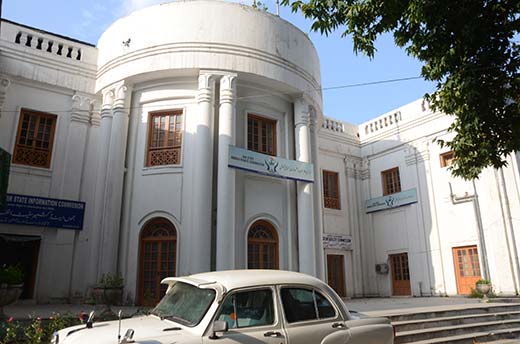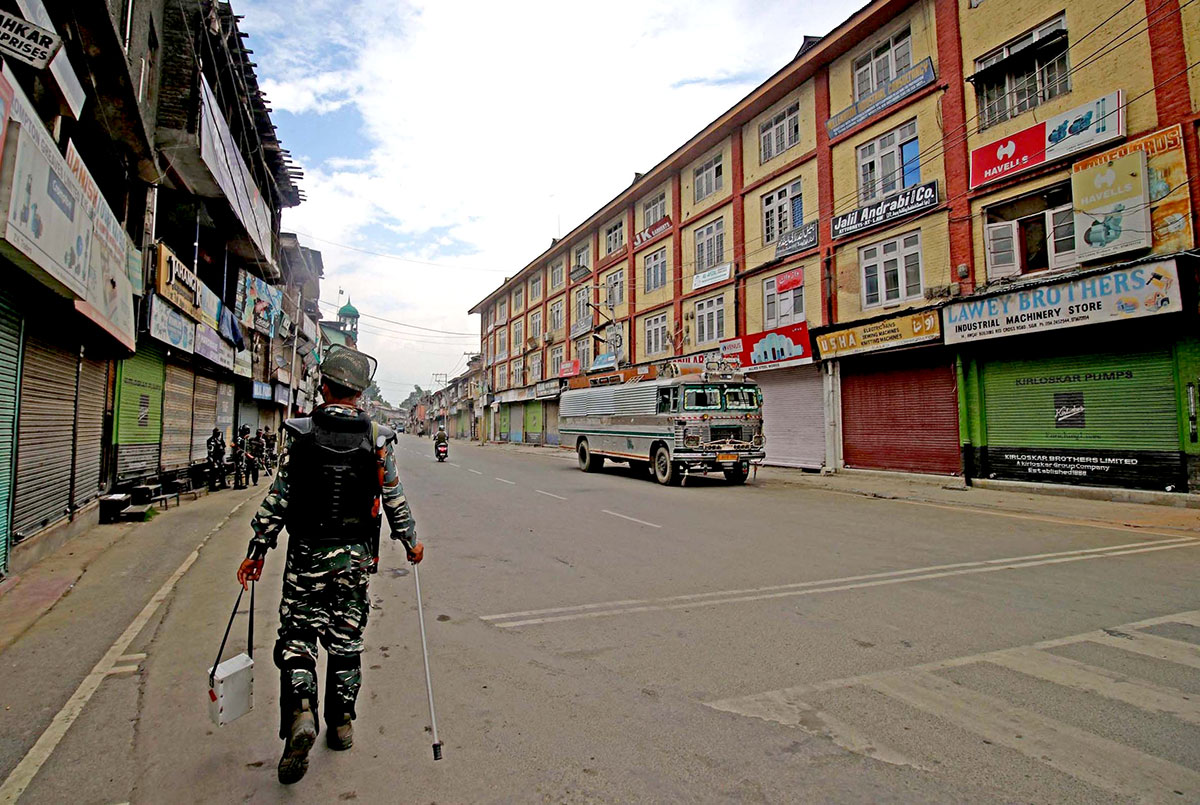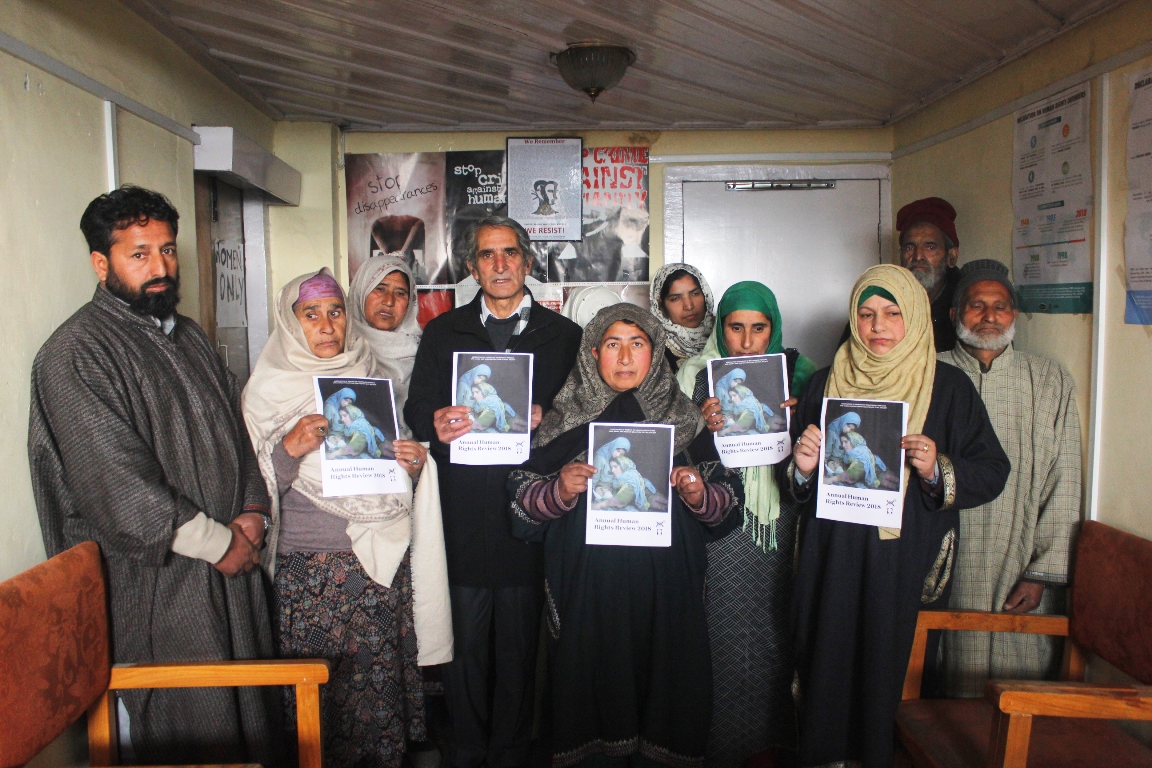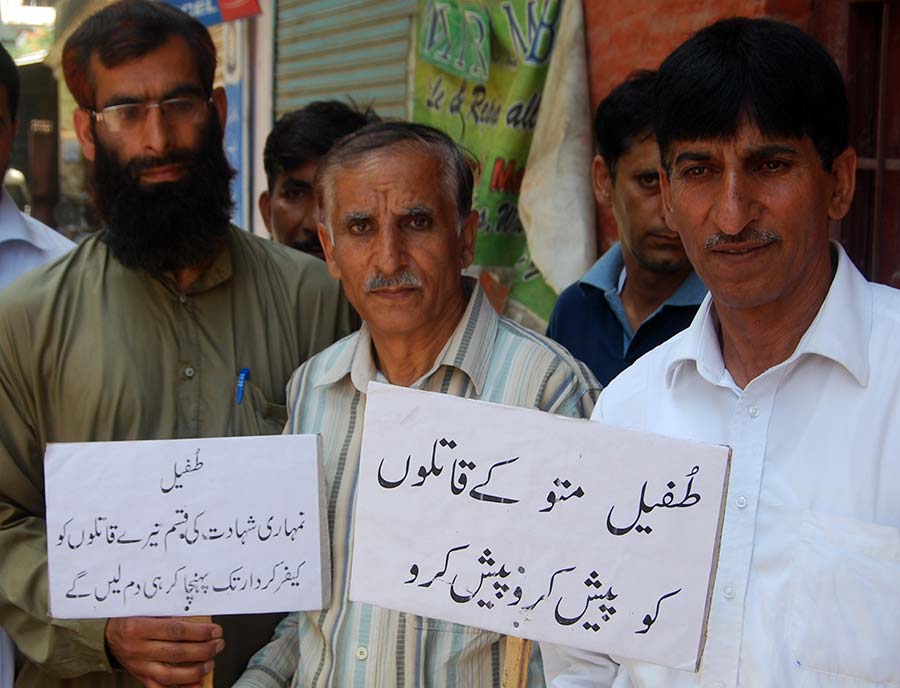Closure of the State Human Rights Commission has deprived victims of human rights violations in Kashmir of their only shot at speedy justice. Almost a year later, the NHRC is trying to pick up the threads, reports Saima Bhat

Every day around ten people visit the locked white building of the State Human Rights Commission (SHRC) to check if this office has resumed work. But to their dismay, they find it deserted as all doors remain locked.
“I see people coming from far-flung places and leave with a heavy heart after finding the office closed,” said a canteen owner on the premises of old secretariat.
There is no message for the public’s information that the office has been closed. But this canteen owner informs the visitors the commission may not open again.
Abdul Rashid Wagey, 32, a resident of Dopatyar Bijbehara frequently comes to Srinagar to check if the SHRC has resumed functioning. His long-pending case with the commission, he rues, was due to be shifted to High Court for a final decision after just one more hearing.
His last hearing was six months ago (prior to the Commission closure) and he has no information about the progress of his case as the commission ceased to exist after the erstwhile state of Jammu and Kashmir was stripped of its special status and divided into two federally governed Union Territories (UT). Wagey feels he has been left in the lurch. His case file which contains all documents remains with the SHRC and he has no clue what might have happened to it.
Wagey, need-based casual labour in the Power Development Department, lost his right hand in an accident in February 2017. “I was then posted at Hassanabad and I was asked to repair a jumper at Bijbehara railway station,” he says. “We called the control room to stop electric supply in the area but as I climbed the pole and touched the line with my right hand, I was electrocuted.”
When Wagey opened his eyes he was lying on a bed at SKIMS in Soura writhing with pain. He was later informed that he was initially taken to a local district hospital from where he was referred to SMHS hospital in a critical condition and then to SKIMS.
At SKIMS, he underwent three surgeries in 32 days: his right hand was amputated, his right underarm that literally had burst out was operated upon and one more surgery was performed on his left side below the rib. He said one organ was also removed from his left side but was not able to name it.
After staying home for two months, Wagey says, he rejoined his job. Meanwhile, he had to fight to get his FIR registered himself. “I had to literally beg before the local station house officer (SHO) to register an FIR. Once this was done, I went to the SHRC in January 2018 to register my case because my department wasn’t ready to give me any relaxation in confirmation of my service as a result of the accident,” he says.
Wagey hoped the SHRC would help regularise his temporary job. But to his pleasant surprise, the commission not only initiated proceedings to get his employment formalized but also recommended ex-gratia relief.
“I got one-time relief of Rs 1 lakh. I was very happy that the commission was seriously working for my benefit. And on the last hearing, the chairperson had sent a letter to chief engineer of PDD to appear in person so that my job gets regularised,” Wagay said. “The file was supposed to be sent to High Court for the final order. My case was at the final stage.” “I have already been working for eleven years in the department. My name falls in the list of 2600 other need-based employees when I should have been given priority because of my accident that happened in the line of duty.”
Wagey was ’recruited’ in May 2008. Soon after he married. His in-laws requested him to stay at their house so that he could take care of them. His wife’s parents are disabled.
“My whole file is with SHRC, which was my only source of hope. If anybody asks me to show any document what will I show? Even the pictures of my accident are in that file only,” laments Wagey. “After SHRC closure, it feels like I am ruined. I don’t have any proof of my accident.”
Now a father of a two years old son, Wagey regularly attends his job. He does all the jobs except climbing the poles.
“It would be better if the department released our salaries on time. My 2019 salary is still pending and only in December, they credited me with the salary of two months from 2018. But even here eight days of my salary have been deducted and it happens every now and then.” Wagey says. “I don’t complain with any of my seniors for this reduction because it may annoy them and I might get expelled from the job.”
This practice, he says, goes on with every need-based employee of the department.
“We have cows at home and we sell milk to keep our kitchen running. My aged parents-in-law get a monthly reimbursement of Rs 1000 from the social welfare department. Otherwise, my family would be on the road,” Wagey said. “It is the hope of a permanent job that keeps me going.”
August 5 Fallout
Revocation of Article 370 has resulted in repealing of over 100 Jammu and Kashmir laws on October 31, when the erstwhile state was formally divested of its autonomy under the constitution of India. This included the laws that governed the functioning of the SHRC. The closure of the SHRC has put a question mark on the fate of thousands of cases of human rights violations many of them related to mass graves, enforced disappearances, extrajudicial killings and rape.

From the date of its inception in 1997 to March 31, 2019, a total of 8529 cases of torture, disappearances, extra-judicial killings, harassment by forces, service matters, and other cases of human rights violations were registered with the commission. Out of these, as per the officials, 7725 were disposed off with recommendations given in 1862 cases. On the last day of the commission, an official, who wished not to be named, said the action was ongoing on around 1100 cases.
According to the Jammu and Kashmir Reorganisation Act, 2019, the National Human Rights Commission (NHRC) will be extending its jurisdiction to the union territory of Jammu and Kashmir. Meanwhile, the building housing the SHRC has been handed over to the estate’s department. The officials said the record is now with the Law department and the staff has been shifted back to the departments of litigation, advocate general and law commissioner.
SHRC Contribution
SHRC was only empowered to make recommendations and act in supervisory, advisory and supportive roles to the victims of human rights excesses. Many people had tied their hopes with this government office despite many calling it a “toothless tiger”. In 2007, the Jammu and Kashmir government created a separate investigation wing for the SHRC headed by the Inspector General of Police.
According to the JKCCS yearly report in 2017-18, 27 of the 432 cases studied (6.25 per cent) made it to the State Human Rights Commission (SHRC), of which 20 received favourable recommendations; in 2017, the state government accepted seven of the 44 compensation recommendations the commission made. The government has accepted 58 of the 229 recommendations (25 per cent) made by the commission since 2009.
As a people-friendly system, the victims didn’t need to hire lawyers, instead, they could fight their cases on their own.
The commission was mostly known for sanctioning ex-gratia relief or helping provide jobs under SRO 43. But the recommendations for investigations or prosecutions were not accepted by the government says Khuram Parvez, a human rights defender and coordinator at Srinagar-based J&K Coalition of Civil Society (JKCCS).
“Even if this was just a recommendatory body but we still filed various human rights violation (HRV) cases with the commission which acknowledged that the crimes have happened,” says Parvez. He recalls the biggest case filed by them was of the mass graves, where SHRC arrived at the same conclusion following an investigation by its police wing. “This lent credence to our 2008 report on various unidentified mass graves, which became our major success. The report was then covered by all international forums.”
After that, the JKCCS filed another petition regarding the 2700 unidentified mass graves in Baramulla, Bandipora and Kupwara. “SHRC gave its judgement that our figures of 2700 appeared to be on the lower side but they recommended that DNA testing should be done and then matched with the families of disappeared people to establish if they belong to them,” says Parvez. “But the then government did not accept it saying there are only 16 laboratories across India so testing of these unidentified mass graves won’t be possible. And that it can become a social upheaval.”
Parvez says the JKCCS then filed another petition for the identification of around 3700 mass graves in the twin districts of Poonch and Rajouri. “They (SHRC) investigated it and the government accepted that 2500 unmarked graves are there. The SHRC again recommended government for the DNA testing, which was not done,” he says. “In a way, it was a big achievement but a partial one as justice was not done. But we got an acknowledgement that people are being killed in custody or fake encounters and then buried secretly in unmarked graves.”

Currently, there were at least ten cases of JKCCS that were closer to final judgement. “One petition was filed regarding 507 enforced disappearances in Baramulla and Bandipora districts in 2012. The enquiry was already done but it was still a live case because police submitted its report late. Another petition was filed for 132 disappeared people in Banihal district but the judgement was also pending in this case,” says Parvez.
“Then there was a petition of 143 cases of reported rape and molestation, in which the petitioner had asked SHRC that the government should report that other than these 143 cases how many more such cases have been reported at the various departments but the case remains stalled now.”
But all the human rights cases with regard to the security forces were not taken up by the SHRC. Though the JKCCS filed a few cases, the Army didn’t appear saying they were not accountable to the SHRC.
Dismal Record
In the absence of SHRC now, the human rights defender says the fate of cases will depend on how these cases will be pursued. “It is not about our struggle but it is their struggle to prove their credibility,” says Parvez. “But so far NHRC’s credibility in Kashmir is dismal.”
The first case from Kashmir that went to the NHRC was Bijbehara massacre that took place on October 22, 1993. Forty-three locals were killed when the BSF fired at people protesting against the then siege of Dargah Hazratbal shrine. The state enquiry has found that the firing on procession was absolutely unprovoked. However, with the NHRC, the case lingered for seven years before it was closed for lack of witnesses in September 2000.
While seeking documents and details, however, the NHRC was able to at least know the security personnel who were part of the posse that fired upon the procession.
In comparison, however, the SHRC had played a better role in helping a significant number of victims of human rights abuse get some form of justice. Advocate Tabish says, “SHRC was a quick redressal system. We have human rights violation cases listed in the high court but then they are placed at the serials where they never get a chance to be heard. Only the dates get extended.”
Crimes Against Women
The crimes against women are increasing across India. There is a debate that there should be speedy justice for the cases related to rape and molestations. But for the last five years, the Kunan Poshpora rape case is in the Supreme Court and is yet to be heard.
The state of other cases is not very different.
During 1996 winter, Flori was a student and as a routine, she left her home for tuitions. But she could not reach her destination. Just outside her house at Neepora area in Mirbazar Anantnag, a stray bullet hit her in the neck. Later, she came to know the stray bullet had come from a cross-firing incident that had happened between “army and Ikhwanis” on the link road next to her house.
“The bullet pierced my neck and went down to spinal cord damaging it permanently,” says Flori. “From a local hospital, I was referred to SKIMS in critical condition. I remained admitted for 25 days and then doctors declared my condition as untreatable and suggested I go home.”
For four years Flori remained confined to bed and developed severe bed sores for which she had to dress her wounds regularly. This was not possible without help. Then her father, a labourer, was told by some friend that they should move to Delhi where Flori could be treated. Desperate father followed the advice.

“We went to Delhi where my MRI was done. Those days this service was not available in Kashmir” says Flori. “But the MRI showed the bullet was still in my body and the doctors declared my condition could not be helped.”
After 23 years, Flori’s two sisters are married now. Youngest is an undergraduate student and the older of her two brothers dropped out of his school in class twelfth in 1996 to take care of his disabled sister and the second one is a university student.
In 2013, Flori’s brother came to know that her case can be registered at SHRC. Since then she has been pursuing a case for compensation and a job for her older brother so that he could take care of her in future as well.
“My parents are already old. Father doesn’t earn so for how long can I be a burden on my siblings,” Flori asks. “What after my youngest sister gets married? As of now, she helps me move.
Flori says her case at SHRC was at the final stage and she was happy that out of the compensation amount she could hire a nurse. For now, she is managing herself with two wheelchairs donated by two NGOs.
It was quickly revealed by the government that the mandate of the NHRC stands extended to Jammu and Kashmir. Almost a year later, the NHRC has made some communications with the government in Jammu and Kashmir. But there is nothing concrete as such.

